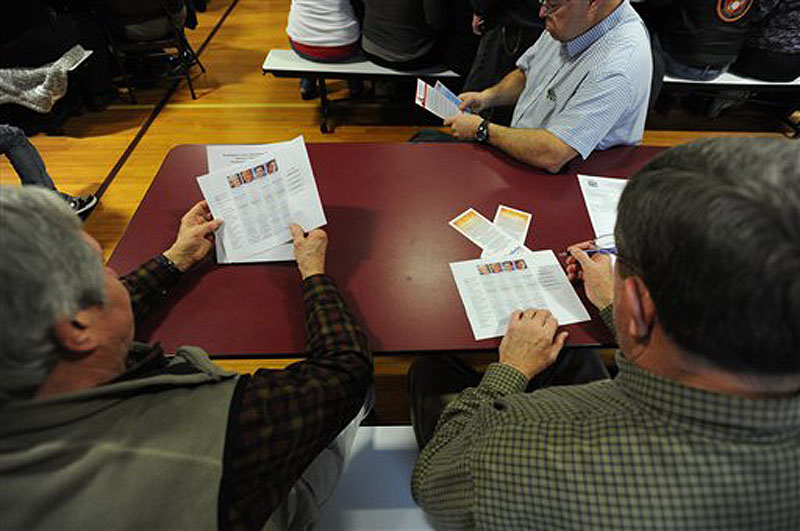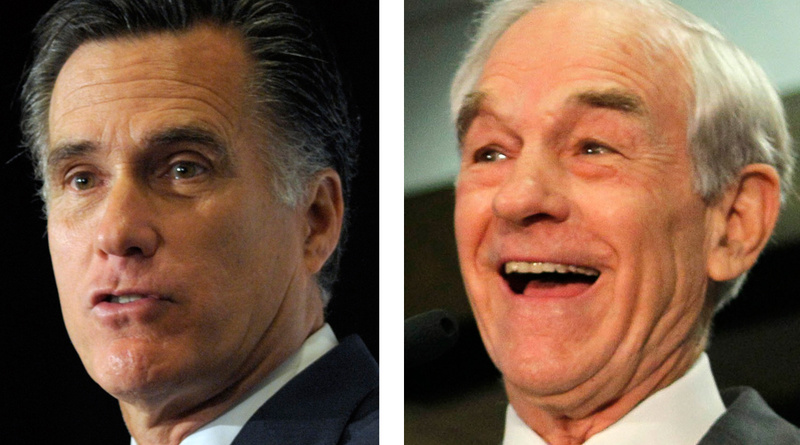EAST MACHIAS — Ron Paul gained ground but failed to overtake Mitt Romney in Saturday’s Republican presidential caucus in eastern Maine, which was held a week after the state Republican Party declared Romney the winner of Maine’s GOP caucuses.
Paul gained 83 votes on Romney as a standing-room crowd packed Washington Academy, where Republicans from more than two dozen towns gathered to cast their votes. Paul received 163 votes to Romney’s 80. Rick Santorum got 57 votes, and Newt Gingrich received four votes.
The Washington County town of Danforth also held its caucus Saturday, bringing the county’s totals to 167 for Paul; 86 for Romney; 59 for Santorum; and five for Gingrich.
The Maine Republican Party previously announced Romney won the state with a 239-vote margin, and the newest figures from Washington County would cut that margin down to 158 votes.
The totals announced Feb. 11 were challenged because they didn’t include Washington County’s caucuses, which were postponed a week due to a snowstorm.
County GOP Chairman Chris Gardner said the state party should include the caucus tally in the final results, even if it didn’t affect the final outcome. The Republican State Committee will consider the request next month.
Gardner told an enthusiastic crowd Saturday that it’s important that their voices be heard. “We’re here because it matters,” he said.
Maine GOP Chairman Charlie Webster initially announced a week ago that Romney narrowly won with 2,190 votes, or 39 percent, compared to 1,996, about 36 percent, for Paul. The party said Friday that a recount showed that Romney won with a 239-vote margin out of 5,814 votes cast.
With heightened interest in the caucus, along with Saturday’s sunny weather, Gardner expected a good turnout in Washington County, which is nestled in far eastern Maine along the Canadian border and has a population of about 32,000 people.
“We have never seen this type of press around a caucus event in Washington County,” Gardner said. “It’s obvious people have a renewed or newfound interest in our little county and our proceedings.”
In all, 306 votes were cast Saturday, with 2 of them going to “others.” That compares to 113 votes cast in Washington County caucuses in 2008, and 120 in 2010, according to state Senate President Kevin Raye, a Republican from Perry.
The Republican State Committee will consider Washington County’s request to have its votes added to the statewide total at its next regular meeting on March 10, said Mike Quatrano, the party’s executive director.
Maine’s caucuses are like no other. In most states, parties hold caucuses in a day. In Maine, Republicans have from January to March 20 to hold local caucuses. But the state committee told towns that if they want to be included in the presidential preference poll, they need to hold caucuses between Feb. 4 and Feb. 11.
Dozens of towns elected to stick to their own timetables. In fact, a number of towns in Hancock County and elsewhere in the state also held caucuses Saturday.
Ignoring a request by the state party might come as a shock in other parts of the county. But Maine’s Republicans don’t like to be told what to do, reflecting the state’s independent spirit, said Rick Bennett, a GOP national committeeman.
“There is a tradition and tradition often trumps the guidance that might come from some distant authority,” he said, referring to the GOP state headquarters in Augusta.
Thus, the unveiling of the winner truly was a snapshot of activists who chose to participate, and the nonbinding straw poll may not have much bearing on the apportionment of delegates to the national convention. That will happen at the state party convention in May.
“Delegates are not committed,” Bennett said, “so it’s more of a beauty contest than an indication of how those delegates will fall at the convention.”
Maine used to have presidential primaries – a one-day vote at polling places – but those were scrapped because the parties had to pick up the costs.
There are advantages to caucuses, however, because local leaders have flexibility in terms of timing.
Maine’s leisurely way of caucusing does carry advantages for a candidate like Paul, who has a loyal base of supporters.
“People realize,” Bennett said, “they can come here and make their case and without spending outrageous sums of money get their message across.”
Send questions/comments to the editors.




Success. Please wait for the page to reload. If the page does not reload within 5 seconds, please refresh the page.
Enter your email and password to access comments.
Hi, to comment on stories you must . This profile is in addition to your subscription and website login.
Already have a commenting profile? .
Invalid username/password.
Please check your email to confirm and complete your registration.
Only subscribers are eligible to post comments. Please subscribe or login first for digital access. Here’s why.
Use the form below to reset your password. When you've submitted your account email, we will send an email with a reset code.